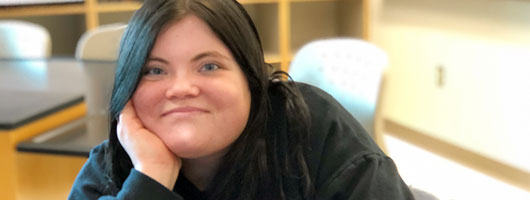 Pictured | Rebekah Jane Zimmerman Baldwin | Elementary Education, Special Education | Etna Green, Indiana (hometown)
Pictured | Rebekah Jane Zimmerman Baldwin | Elementary Education, Special Education | Etna Green, Indiana (hometown)
Secondary Education Transition to Teaching Licensure Program
The Transition to Teaching (T2T) Licensure Program at IU South Bend is an alternative route to licensure program designed for mid-career professionals with a bachelor’s degree who want to become licensed teachers in the state of Indiana. The rigorous, field-based program is most appropriate for mid-career changers. To participate in the program for either developmental level (secondary education or elementary education), all applicants must hold a bachelor’s degree from an accredited institution of higher education, and take and pass the Pearson Core Academic Skills Assessment (CASA) for basic reading, writing, and mathematical skills, or produce passing scores from a different, state-approved, alternate assessment. Additional requirements for entry are listed for each licensure program below.
The program is offered when there are an adequate number of qualified cohort candidates who commit to participation.
Secondary Education Transition to Teaching
The Secondary Education Transition to Teaching Program is approved by the Office of Educator Licensing and Development to recommend for licensure in the following content areas: mathematics; English; world languages (French, Spanish, and German); social studies (historical perspectives, government and citizenship, geographical perspectives, economics, psychology, and sociology); science (life science, Earth/space science, physical science, physics, and chemistry). IU South Bend is not approved to recommend licensure in any other areas. The program licenses for grades 5-12.
Originally designed for adults interested in mid-career changes, all of the courses in the program are offered online or in the evening. Applicants should be aware, however, that field observation and student teaching requirements do require a commitment to being in secondary classrooms for specified amounts of time during the regular school day.
As the courses in the Secondary Transition-to-Teaching program focus on pedagogy and related curricular issues, and content instruction is not part of the program, all candidates must demonstrate acceptable levels of content knowledge prior to entering. Candidates may do this in one of the following ways:
- Holding a bachelor’s degree in the subject the candidate wants to teach with a grade point average of at least 3.0 in the major and overall
- Holding a bachelor’s degree with a grade point average of at least 2.50, both in the major and overall, and five (5) years of professional experience, or
- Holding a bachelor’s degree from an accredited postsecondary educational institution, and proof of passing state-approved content area examination(s) in the subject area
- All candidates enrolled in the Secondary Transition-to-Teaching program will be required to provide passing scores from the Pearson content area assessments related to their licensure areas prior to student teaching, as this is a licensure requirement in the State of Indiana. As a result, all candidates entering the Secondary Education Transition to Teaching program are strongly encouraged to take the assessments prior to entering the program, even if they are eligible for entry based on major, GPA, and/or work experience.
Essential Courses in Secondary Education Transition to Teaching
- EDUC-K 524 Integration of Students with Exceptional Learning Needs
- EDUC-M 500 Integrated Professional Seminar (1 cr.) (three semesters)
- EDUC-P 475 Adolescent Development and Classroom Management
- EDUC-R 503 Instructional Media Applications
- EDUC-S 514 Advanced Study in the Teaching of Reading in the Junior High and Secondary School
Select one of the following:
Candidates in the program will also need to select one of the following advanced methods courses based on their designated area for licensure. It is important to note that a 30-hour field experience accompanies this set of course. Candidates will be assigned to a specific classroom in an area secondary school, and they will observe, design and implement lessons, and participate in the classroom activities during the regular school day for a few hours each week over the course of the semester. Specific days and times for field observations will be determined between the teacher candidate and the cooperating classroom teacher; however, candidates must plan to be available during the school day on the days when they have scheduled observations.
- EDUC-M 441 Methods of Teaching Senior High/Junior High/Middle School Social Studies
- EDUC-M 445 Methods of Teaching Senior High/Junior High/Middle School Foreign Languages
- EDUC-M 446 Methods of Teaching Senior High/Junior/Middle School Science
- EDUC-M 452 Methods of Teaching Senior High/Junior High/Middle School English Language Arts
- EDUC-M 457 Methods of Teaching Senior High/Junior High/Middle School Mathematics
Student Teaching
During the final semester of the program, Secondary Education Transition-to-Teaching candidates will complete 11-weeks of full-time student teaching in their designated content areas, in a secondary classroom. Student teaching emulates full-time teaching, and candidates are expected to maintain the same hours as classroom teachers, and to participate in a variety of different extra-curricular events to better understand the life of the school as a whole. Teacher candidates will need to apply for their student teaching experiences, submitting to the Director of Student Teaching and Clinical Practice a list of preferences for placement. While the Office of Student Teaching and Clinical Practice will try to accommodate placement requests by candidate, the Director will make the final determination. For more information, please contact the Director of Student Teaching and Clinical Practice.
Photo credit | Teresa Sheppard